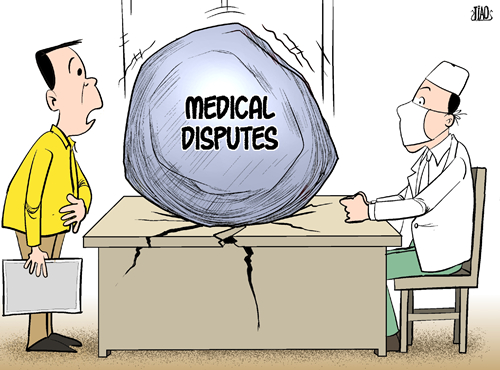Hospital violence sign of doctor-patient strife
- By Ni Tao
 0 Comment(s)
0 Comment(s) Print
Print E-mail Shanghai Daily, May 7, 2012
E-mail Shanghai Daily, May 7, 2012
 |
|
[By Jiao Haiyang/China.org.cn] |
Nowhere on earth is the relationship between doctors and patients more murderously strained than in China.
A spate of deadly attacks on doctors by vengeful patients and their families has exacerbated tensions and prompted authorities to crack down on violence at hospitals.
The ministries of public security and health recently publicized a joint circular that makes seven acts of disturbance at hospitals liable to legal punishment.
These acts include, for instance, turning hospitals into mourning halls for dead patients, burning paper money supposed to be used by the dead in their afterlife and worst of all, putting on display the bodies of the deceased who their relatives believe have died as a result of erroneous prognosis, negligence and medical malpractice.
Oftentimes a patient's body is used as a bargaining chip to wring more cash compensation from hospitals, which are desperate to avoid the damage such stunts will do to their reputation and business.
The stakes are higher when yi nao, professional troublemakers, are paid to play the roles of angry relatives, thus intensifying doctor-patient strife for pecuniary gains.
Flawed litigation
CCTV reported early last week that the Ministry of Health reported 17,243 cases of major disturbance at the nation's hospitals in 2010, up 7,000 from five years before.
In many of these cases, triad-like gangs were involved in upping the ante, the state broadcaster said.
The Xinmin Evening News noted on Thursday that these extortionist machinations are driven in big part by the belief that "big rows bring big money, small rows less, no rows no compensation at all."
One of the main reasons patients have turned to yi nao rather than the law to seek redress in medical disputes is that they are deeply skeptical of the litigation process, which is extremely slow.
Some victims of possible medical error finally take revenge on doctors as they see no hope in righting the wrongs through the law. Scuffles are common.
The Southern Weekend newspaper opined in October that prolonged and ineffectual medical litigation often makes matters worse. It referred to the case of a cancer patient who, convinced that the doctor's botched surgery on his throat had made him mute, fatally stabbed her with a knife in Beijing Tongren Hospital on September 15. The man had sued the doctor and hospital for compensation but the case dragged on for four years without a ruling. Out of desperation, he raised the knife.
Such loopholes in our legal aid system, unless plugged, will inevitably be exploited by yi nao.





